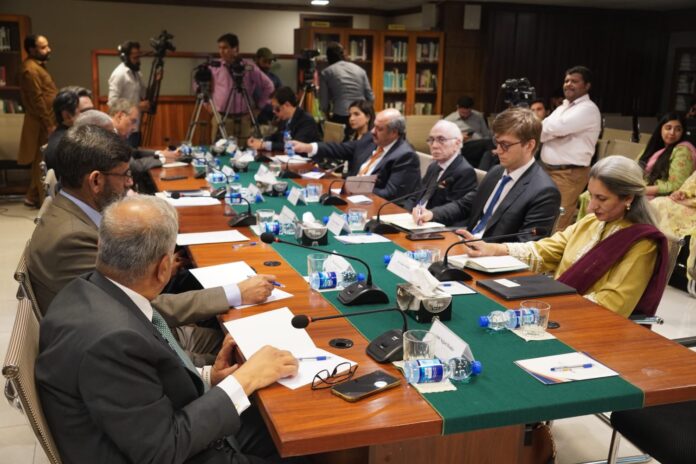- Advertisement -
ISLAMABAD, Apr 28 (APP):The Islamabad Policy Research Institute (IPRI) on Monday organized a roundtable conference to commemorate the 80th anniversary of the victory in the Second World War and the establishment of the United Nations (UN).
The event gathered scholars, diplomats, and analysts to discuss the significance of the historical events and their lasting impact on international relations, said a press release.
Speakers at the roundtable included Igor Kolesnikov, Press Attaché at the Russian Embassy; Dr. Zafar Nawaz Jaspal from Quaid-i-Azam University (QAU); Alexey Kuprianov, Journalist; Dr. Gul-i-Ayesha Bhatti from the National University of Sciences and Technology (NUST); Ambassador Masood Khalid, former Ambassador to the People’s Republic of China; Dr. Salma Malik from QAU; and Dr. Ali Ehsan from DHA University.
The conference opened with an overview of the Soviet Union’s role in ending the Second World War. Participants highlighted the strategic efforts, sacrifices, and military campaigns that were critical in defeating the Axis powers. The discussion underscored how the outcome of the war set the foundation for the establishment of the United Nations in 1945, with the aim of promoting peace, security, and cooperation among nations.
Speakers reflected on the commitment made by the founding members of the United Nations to prevent the recurrence of global conflicts. It was noted that the Charter of the United Nations was created to embody these collective aspirations, outlining principles of sovereign equality, peaceful dispute resolution, and respect for international law.
The discussion then turned to the changing dynamics of the international order. It was observed that the current global environment is experiencing a transition from a multilateral system, traditionally centered on institutions like the United Nations, towards a more multipolar world. Participants examined the rise of regional powers and the formation of new alliances, which are influencing the structure and functioning of international relations.
Attention was also given to the economic dimension of emerging geopolitical trends. The ongoing tariff disputes and economic competitions between major economies were discussed as key drivers of global polarization. Speakers noted that such developments could lead to the formation of competing economic and political blocs, reducing the effectiveness of global consensus-building mechanisms.
Throughout the session, emphasis was placed on the need for constructive engagement and dialogue to manage growing divisions. The role of international institutions was discussed in the context of adapting to new realities while maintaining the core objectives established at the United Nations’ founding.
The conference concluded with a call for renewed commitment to the principles of collective security and peaceful coexistence. Participants stressed that while the global landscape is shifting, the lessons from the Second World War and the spirit behind the formation of the United Nations remain relevant for addressing contemporary challenges.
IPRI expressed its commitment to fostering dialogue on critical international issues and contributing to policy discussions aimed at promoting stability and cooperation.

